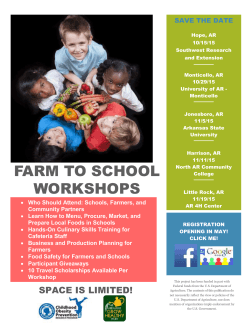
Vietnam - Grow Asia
Vietnam’s Public Private Task Force on Sustainable Agriculture Supported by Grow Asia GrowAsia Vietnam GrowAsia Vietnam Vietnam has succeeded in harnessing agricultural growth to power economic expansion and poverty reduction. The agriculture sector provides 60% of employment and 22% of GDP. The government has placed a high priority on industrialization and modernization of rural agriculture, setting a target of 3.5% annual growth in the sector until 2020. Private-sector investment is seen as critical to achieving that target. Population Official GDP growth rate (2013) 90.2m 5.4% Agricultural contribution to exports 30% Population living below poverty line Agricultural contribution to national GDP Population in agricultural employment 17% 22% 60% Agricultural earning per capita per year Quantity of farmers growing rice $367 45% GrowAsia Vietnam Vietnam’s Public Private Task Force on Sustainable Agricultural Growth Under the leadership and direction of the Minister of Agriculture and Rural Development, Vietnam developed a 10-year agricultural development strategy in 2010 aimed at advancing sustainable, large-scale agricultural production with improvements in productivity, quality,andcompetitivenessineffortsto achieve national food security and economic growth. In November 2011, the Government of VietnamratifiedtheadoptionoftheWorld Economic Forum’s New Vision for Agriculture (NVA) framework into the country’s 10-year national agriculture strategy. The Public Private Task Force on Sustainable Agricultural Growth in Vietnam was formed inMay2010attheWorldEconomicForum on East Asia in Ho Chi Minh City. CoChaired by the Minister of Agriculture and Rural Development and Nestlé Vietnam, the task force is comprised of global and local companies, provincial governments, national research institutes, international organizations and NGOs. It focuses on six crops and one cross-cutting theme of agrifinance.ASecretariatisbeingestablishedto coordinate the activites of the Task Force with participation from the government and the private sector. Coffee Target Engage 20,000 Vietnamese coffee farmer households (5% of national total) within 5 years. The group has scaled to 75 demo plots in four provinces to engage 4,158 farmers. The demo plots conduct training (280 Farmer Field Schools in 4 provinces with 10,200 training days delivered), share knowledge, solve problems, and build capacity of extension workers. Results In the 2014–2015 season, the project: — Increased farmers’ yield by 21% and net income by 14%. — Visually higher quality with healthier trees, leaves and bigger and shinier cherries. — Reduced water footprint by 30% from 1,390 to 470 litres/plant/irrigation. — Monitored and balanced plant nutrition reducing fertiliser use by 18–23% depending on location. — Reduced the carbon emission by 63% (1486 kgCO2e/ton versus 661 kgCO2e/ton for normal beans). — Introducednewhigheryieldingcoffee varieties. In September 2013, the Government of Vietnam institutionalised the partnership byestablishinganewVietnamCoffee Coordination Board (VCCB) at the nationallevel, comprised of members from public and private sector to coordinate the sustainable effortsofthewholeindustry.TheTaskforce’s CoffeeWorkingGroupformstheSubProduction Committee of the VCCB. TheWorkingGroupissettingupfarmer cooperatives and farmer groups to enable provisionoffinancingsolutionstothefarmers through a wholesale model and direct linkages withtheinputcompaniesandthecoffee buying companies. GrowAsia Vietnam Commodities (Corn) Fisheries Target Increase corn productivity by 30% in 3 years (2014–2016) and increase farmer profit by over 30%. Target Offer Vietnamese consumers a good quality fresh fish which is produced in a sustainable way and processed under international hygiene and food safety standards. The government plans to convert 83,000 hectares of rice farm land to corn in the Mekong Delta by 2020. In this context, the WorkingGrouppartnersconductedfarmer fielddemonstrationsfortwohigh-yielding conventional hybrid seeds for corn. Training on better agronomic practices and post-harvest services is also provided. Following regulatory approvals, Monsanto and Syngenta will plant biotech corn seeds with weed management and insect protection traits. New high-yielding hybrid seeds with similar traits are going through the registration process. Feedmills are being encouraged to invest in corn dryers and contract direct with farmers to create further value for farmers via corn trading. The Government of Vietnam has established a special committee focused on rice to corn diversificationandisplanningtoofferfarmer financingtofurthersupportcropdiversification by farmers. The project has reached 8,000 farmers covering 4,000 hectares. Farm productivity has increased by 200% compared to national average and farmer incomes have increased 2.5 to 4 times compared to rice production. The project also reduced water use by 40%, pesticide and fungicide use by 25%, and labor, cost and time by 80% per hectare. Commodities (Spices) A new working group on spices was set up with a focus on Pepper in December 2014. It will be co-chaired by MARD, Vietnam Pepper Association and IDH. Corporate partners include Harris Freeman, Nedspice, Olam and Simexco. SNV will provide farmer training. The group has: — Trainedandcertifiedover400farmers/ collectors. The total investment in farmer trainings, since September 2011, is over US$200,000. — 70 farmers have been trained and are implementing the METRO requirements. — 1farmerhasVietGapcertification.25more farmersareintheprocessofbeingcertified with support from General Department of Fisheries at MARD. — Species sourced include barramundi, climbing perch, frog, knifefish,pangasius, shrimp, snakehead, piranha and red tilapia. The project has played an increasingly important role in integrating the fresh fishcoldchainintothedomesticmarket, connecting farmers to the modern trade network, increasing farmers’ incomes as well as promoting good sustainable agricultural practicesamongVietnamesefishfarmers. Fruits and Vegetables Target By 2015, to raise average yields of chipping potato crop to 20 tons/hectare in the South and to 16 tons/hectare in the North (21% and 33% higher from current average yield respectively). Initially focusing on potatoes, the group has introducednewvarietiesofpotatoes,offering increased productivity and income to farmers. Trials of four varieties have been completed with 3 dominant varieties being put forth for registration. Based on feedback from the group, the Ministry is reviewing the registration process to reduce time taken. GrowAsia Vietnam In the South, the yield achieved in 2014 was 20.7 tons/hectare and for 2015 the aim is to produce 5,500 tons of potato with an average processed yield of 22 tons/hectare and expand production to 25 hectares in Dak Lak province. Three farmer trainings are held annually. By 2015, at least 30,000 tons of Vietnamese teawillbeRainforestAlliancecertified, increasing farmer livelihoods through yield improvement and increased quality of tea, and ensuringtheenvironmentalsobenefitsfrom project activities. In the North, potato seed trials are continuing for registration purposes. In 2015, the target is average processed yield of 18 tons/hectare. Commercial production has started to export 500 tons to Indonesia. Three training for the trainers are held annually for supplier representatives who will in turn train farmers and village leaders. Agri-Finance Overall, in 2014 the project reached 1,100 farmers and increased the income of farmers by $1,600 to $3,150 per hectare. Tea Target Significantly expand production of export quality tea in Vietnam, with Unilever as a major buyer. Starting in 2015, Unilever aims to procure 41,300 tons with a 4.0 Quality Index ranking annually and Rainforest Alliance certification. Phase 1 The group has achieved the goal of more than tripling export quantity from Vietnam to 10,000 tons of export-quality tea (3,000 tons of which was Rainforest Alliance certified)initsfirstyear. Phase 2 began in 2013, focusing on: — Investing in tea processing facilities in Yen Bai province (acquired 1 CTC factory, to be extended to 3 CTC lines with provincial approvals in progress). — Initiating a partnership with the IDH to work with over 11,600 farmers in 6 provinces on sustainability training. Currently the project is reaching 1,597 farmers. Target Support the Task Force’s commodity working groups to address financial services challenges and linkages to value chain players; promote information sharing and public-private dialogue on agri-finance solutions and policy requirements. TheAgri-FinanceWorkingGrouphasbeen workingspecificallywiththeCoffeeWorking Grouptoexplorepossiblefinancialsolutions for the farmer cooperatives and farmer groups throughthedevelopmentoffarmerprofiles and credit history and links to banks. In 2015, itwillalsoengagetheTeaWorkingGroup to bridge the knowledge gaps between the working group and banks about the challenges andopportunitiesinfinancingmicro entrepreneurs and SMEs in tea production. April 2015 GrowAsia Vietnam Partners The Task Force engages over 40 organizations: Government Vietnamese Ministry of Agriculture and Rural Development — IPSARD — National Centre of Agriculture Extension — International Cooperation Department — Livestock Department — Crop Production Department — Directorate of Fisheries — Planning Department — Agriculture Genetics Institute (VASS) Provincial Representatives — LâmĐồng — ĐắcLắc — ĐắcNông — Gia Lai Companies Agribank, ANZ Vietnam, BIDV, Bunge, Bunge Vietnam, Cargill, Coex, Cooperative Bank, EDEConsulting,FreshStudio,IntimexBảo LộcBayer,MetroCashandCarry,Minbuza, Monsanto,Nedcoffee,NestléVietnam, PepsiCo Vietnam, Pioneer Hi Bred Vietnam, Rabobank, Simexco, State Bank of Vietnam, Syngenta Vietnam, Unilever Vietnam, Vietin Bank, Vinacafe, Yara Vietnam Engage www.growasia.org/ partneringcountries/ vietnam Pham Quang Huy Ministry of Agriculture and Rural Development of Vietnam hhanh.htqt@ mard.gov.vn Donors, International Organisations and Industry Associations IFAD, International Finance Corporation, IDH The Sustainable Trade Initiative, VCCI, VICOSA, Viet Nam National Vegetables, Fruit and Agriculture Products Corporation Ltd.,VietNamTeaAssociation,WASI, WorldBank NGOs 4C Association, Rainforest Alliance, SNV, Solidaridad Looking Ahead Going forward, priority areas for the Vietnam Task Force include: — Expanding the engagement of local stakeholders. — Scaling up projects to reach more farmers and increase contribution to the goals of food security and economic growth. — Exploring opportunities to institutionalize crop partnerships more formally, learning fromtheexperienceoftheVietnamCoffee Coordination Board.
© Copyright 2025









